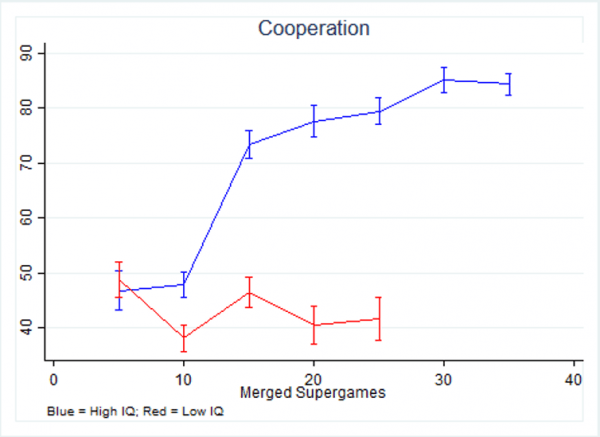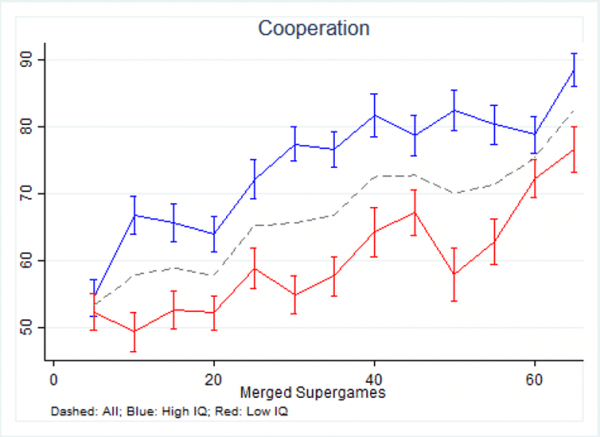
Andis Sofianos, University of Heidelberg; Aldo Rustichini, University of Minnesota, and Eugenio Proto, University of Bristol
What drives people to cooperate with each other? And what characteristics lead a person to do something that will both benefit them, and those around them? Our new research suggests that the answer is intelligence: it is the primary condition for a socially cohesive and cooperative society.In the past, some economists have suggested that consideration of others and generally pro-social attitudes are what motivate people towards more generous and cooperative behaviours which help sustain a cohesive society. Others have suggested that adhering to good norms and respecting institutions push us towards more socially useful behaviours.
But another possibility is that insightful self-interest guides us to become effectively good citizens – and that cooperation arises in society if people are smart enough to foresee the social consequences of their actions, including the consequences for others.
The prisoner’s dilemma
Our study, which took part in behavioural labs in the US and UK with 792 participants, was designed to test these three different suggestions for why people cooperate with each other. In it, we used games that contain a set of rules that assign a reward to two players depending on their decisions.
One of these games was the prisoner’s dilemma game. The easiest way to describe the game is using the original example of two criminals who have been arrested. They are interrogated in separate rooms with no means of communicating with each other. Each prisoner is given the opportunity either to: betray the other by testifying that the other committed the crime – an uncooperative choice – or to cooperate with the other by remaining silent.
If both prisoners betray each other, they each serve two years in prison – the uncooperative outcome. If one betrays the other and the other remains silent, the first will be set free and the other will serve three years in prison – and vice versa. If both remain silent, they will only serve one year in prison – the cooperative outcome.
This is a standard example of a game analysed in game theory that shows why two completely rational individuals might not cooperate, even if it appears that it is in their best interest to do so. It is also a good example of a non zero-sum game – where the cooperative behaviour is mutually beneficial. In general, it depicts a situation reflecting the properties of the interactions we all experience most frequently in society.
As usual in experimental economics, we had participants play this game with monetary payoffs – instead of imprisonment. We matched two subjects in the same session in an anonymous way and we let them play the same game repeatedly for an indefinite number of times. After that, we re-matched them with a different partner and the game started again. And this went on for 45 minutes. Each player learns by adjusting their decisions based on how others in the same room have played in the past.
Intelligence sparks cooperation
We then created two “cities”, or groups of subjects, sorted by characteristics based on cognitive and personality traits that we had measured two days earlier, by asking the participants to fill in a standard questionnaire. One such characteristic was a measure of pro-social attitudes, namely the personality trait of agreeableness. Another characteristic was a measure of adherence to norms, specifically the personality trait of conscientiousness. The third characteristic was that of intelligence.
We then analysed the frequency of cooperative choices they made in the prisoner’s dilemma game – so the number of times they chose the less selfish option. From this we calculated what we called the cooperation rate.
Overall, we found that the higher a person’s intelligence, the more cooperative they became as they continued playing the prisoner’s dilemma game. So while intelligent individuals are not inherently more cooperative, they have the ability to process information faster and to learn from it. We didn’t see such stark differences for the other two groups – those that scored highly in agreeableness and conscientiousness.

Cooperation rate across intelligence groups. Author provided
Helping each other
It’s possible that smarter people may try to use their cognitive advantage and take advantage of others. So in further analysis, we created combined “cities”, grouping together people who are similar across all characteristics in the personality test, and have similar levels of intelligence. We observed something quite different.

Cooperation rate across combined groups. Author provided
As the graph above shows, the smarter individuals – the blue line – within these combined groups helped to teach the less smart ones – the red line – and lead them to eventually increase their cooperation rate by the end of the experiment. This was eventually beneficial for all involved: on average, everyone was better off in terms of earnings. Taken together, these results show how even having a few intelligent people present in a group or the workplace can benefit others.
As other recent research has looked at how education can help from early childhood to develop cognitive ability, our results indicate how such interventions need not only benefit each individual, but society as a whole.![]()
Andis Sofianos, Postdoctoral Fellow in the Department of Economics, University of Heidelberg; Aldo Rustichini, Professor of Economics, University of Minnesota, and Eugenio Proto, Professor of Economics, University of Bristol
This article is republished from The Conversation under a Creative Commons license. Read the original article.
